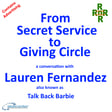
How to Live Happily With Your Dog – a conversation with Drew Brashier
Dog owners need to learn how to speak dog if they want to live happily with their dog.
Drew Brashier is a professional dog trainer with Paw and Order in South Carolina USA.
In this episode of Rest and Recreation, the work life balance podcast from Abeceder Drew explains to host Michael Millward how any dog owner can have a successful relationship with their dog and live happily together.
Drew and Michael discuss the common challenges that dog owners face and some straight forward solutions.
These include
- Breed selection
- Establishing the right rules for a relationship with your dog
- Communicating with your dog
- Understanding what your dog is telling you
- The right sort of attention
- Learning how to be a good dog owner
You can find more information about both Drew and Michael at ABECEDER.co.uk
Audience Offers
Rest and Recreation is made on Zencastr, because creating podcasts on Zencastr is so easy, you can as well by visiting Zencastr and using our offer code ABECEDER.
Travel – Holidays can play an important part in preventing burn out. So take a break at trade prices to anywhere in the world on trains, flights, hotels, and holidays as members of The Ultimate Travel Club.
Health – York Test provides an Annual Health Test. An experienced phlebotomist will complete a full blood draw at your home or workplace. Hospital standard tests covering 39 different health markers are carried out in a UKAS-accredited and CQC-compliant laboratory.
Visit York Test and use this discount code REST25.
Tech Problems? – Visit Three for information about business and personal telecom solutions from Three, and the special offers available when you quote our referral code WPFNUQHU.
If you have liked this episode of Rest and Recreation, please give it a like and download it. To make sure you do not miss future editions please subscribe.
Remember, the aim of all the podcasts produced by Abeceder is not to tell you what to think, but we do hope to make you think!
Being a Guest
If you would like to be a guest on Rest and Recreation, please contact Abeceder.
Matchmaker.fm introduce many guests to Rest and Recreation. Matchmaker.fm is where great hosts and even greater guests are matched, and fantastic podcasts are hatched. Use code MILW10 for a discount on membership.
We recommend that potential guests take one of the podcasting guest training programmes available from Work Place Learning Centre.
Thank you to you for listening.
We appreciate every like, download, and subscription.



















